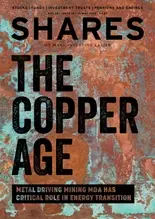
- Online retail giant falls on monopoly probe
- Stripping AWS out, dream for many fund managers
- Any legal action likely to take years
The US Federal Trade Commission (FTC) made its move against online shopping giant Amazon AMZN:NASDAQ) on 26 September, accusing the company of illegally stifling competition on its way to becoming a ubiquitous retail presence and one of the world’s most valuable companies.
Amazon was quick to rebut the lawsuit and its allegations, as you’d expect, but what happens now? If the FTC wins this case, the worst-case scenario for Amazon, as perceived by many, would be for the court to order a massive break-up of the company.
This could possibly see Amazon split in three; Amazon’s first-party retail business (selling goods directly to consumers), it’s third-party retail arm (providing a platform for other sellers), and the cloud computing business AWS, or Amazon Web Services.
HOW AMAZON MAKES ITS MONEY
To understand what this could mean, let’s look at how Amazon makes its money. Most people know that Amazon is the largest e-commerce company in the world, but it is also the world's largest cloud-services company with AWS, and it has other major revenue streams like the various services it offers to third-party sellers, digital advertising, and subscriptions.
| How Amazon makes its money |
| Online & physical stores | 46% |
| Third-party seller services | 23% |
| AWS | 16% |
| Advertising | 7% |
| Subscriptions (Prime) | 7% |
| Other | 1% |
| Source: Amazon |
A key point here is that while AWS made 16% of total revenue last year, it pretty much accounts for every dollar of operating profit. The retail side is super low margin and has struggled for years to generate profits.
This is why fund managers and analysts have been for years hoping Amazon would strip AWS out from retail. Terry Smith, the Fundsmith Equity (B41YBW7) founder and chief manager, told investors in July that he was selling down its Amazon stake primarily because Amazon has been committing too much capital to retail.
Many analysts agree. In a note issued overnight, DA Davidson analyst Tom Forte, wrote that ‘in the event the government breaks Amazon into three parts; 1) first-party retail, 2) third-party retail, and 3) cloud computing,’ that the stock would still likely be ‘worth more on a sum-of-the-parts basis, if the lawsuit ends in the company getting cut into pieces.’
‘Based on our sum-of-the-parts analysis, we believe shares could be worth as much as $193 and as little as $148,’ Forte continued.
‘We believe this suggests there is less risk for Amazon than some investors may believe, following this news.’
Amazon’s share price finished 4% lower overnight during regular trading hours, at $125.98, staying largely flat in after-market trading. The stock has rallied 47% year-to-date.
WIN-WIN FOR SHAREHOLDERS
In effect, a break-up that hands shareholders equity in each part of the business, would give them choice to sell stock in the bits they don’t like, and buy more of the bits they do.
The last time a US company was forced to break-up was AT&T (T:NYSE) in 1984, and any lawsuit would take years to get through the courts (and appeals process), and there is enormous scope for alternative action – large fines or enforced changes to business practices.
Wedbush analysts, in a note (26 Sep), said any win for the FTC might be on a smaller scale. ‘While the FTC may secure some form of victory for itself through the ensuing legal battle - potentially monetary penalties and/or the curbing of certain business practices - we continue to believe any material change to the company’s structure is unlikely,’ they said.
‘Consistent with our view ahead of the lawsuit’s filing, we would be buyers of the pullback in shares.’
So, expect nothing much to change anytime soon, and while multiple outcomes are possible down the line, breaking-up Amazon or allowing it to continue as is (albeit with penalties) could be a win-win for shareholders.
Disclaimer: The author of the article (Steven Frazer) has a personal interest in Fundsmith Equity.




